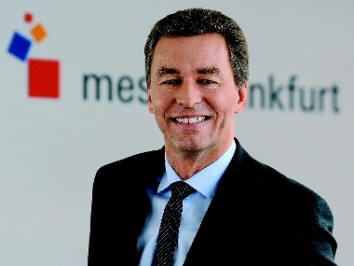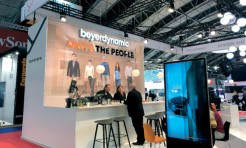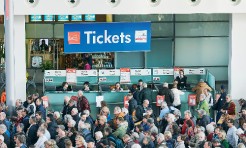Trade fair politics: Do trade fairs need a partner country?
Visits of high-level foreign government officials to German trade fairs always make a huge impact. And there are other reasons why the partner country concept isn’t as passé as some may think.

For Cologne it is a question of marketing whether a partner country makes sense for a trade fair or not. “If we opt for a partner country, it is because we believe it still has a lot of new potential to offer the fair,” argues Katharina Hamma. “Partner country status will make more exhibitors from the country attend the event,” says the Managing Director of Koelnmesse. “And it allows us to intensify our relations with the respective industry in that country.” An interesting partner country can maximise publicity, especially if there are tie-in events and activities. “This benefits the fair just as much as the exhibitors from the partner country,” points out Hamma. In addition, high-level national government officials often open or attend the event. “Of course, this gives us a lot of media attention and generates more publicity for the trade fair.” Above all, it benefits fairs that are normally not so much in the spotlight. For all others it is just an added bonus (www.koelnmesse.de).
Messe Frankfurt believes that partner countries are still very much in tune with the times. “Last year, for example, we were able to welcome the French Minister for Crafts, Trade, and Tourism,” Managing Director Detlef Braun refers to the presence of partner country France at Ambiente 2013. “She opened the fair together with the then German economics minister.” This also led to discussions of major economic policy issues. “That’s the political dimension of a partner country presence,” says Braun. And the public impact is also a factor of great importance. The media interest helps the exhibitors from the partner country, Messe Frankfurt confirms. This interest is further boosted by inviting famous guests from the worlds of politics and entertainment. Often the partner country concept is not just a one-off. “Of course, some of the additional exhibitors that we gain even decide to come back to Ambiente,” Detlef Braun again cites the world’s largest consumer goods fair. “And this attracts new visitors. The partner country entices them to attend for the first time, and later some even become regulars” (www.messefrankfurt.com).

At Messe Düsseldorf the only trade fair with partner countries at the home venue is A+A. Russia was the first partner in 2009, followed by Poland (2011) and Turkey (2013). In 2015 South Korea will partner A+A. “Our aim is to highlight and showcase the market for workplace safety and security in the respective country,” explains Werner Matthias Dornscheidt. “For this purpose we organise market talks for exhibitors, associations and authorities,” reports the chairman of the Board of Management of Messe Düsseldorf. “Topics include market access, standardisation and legal regulations.” Düsseldorf sees the “partner country” tool as a service and export booster for exhibitors and visitors. The partnership with Turkey for A+A 2013 resulted in a close contact with the Turkish Ministry of Labour and Social Security. “This helped us get a joint international project off the ground,” says a happy Dornscheidt about the new Turkish Occupational Safety and Health Exhibition, TOS+H Expo, launched in May 2014 (www.messe-duesseldorf.de).

Messe München believes that the partner country concept makes sense in some cases. “Especially when our aim is to help exhibitors access new or emerging markets,” explains Eugen Egetenmeir. “It can be very helpful in this context to maximise interest also by involving government authorities in these countries,” says the Managing Director of Messe München. “And to welcome business delegations to Munich.” This proved to be very successful at bauma 2013 with Indonesia as its partner, recalls Egetenmeir: “We posted a dramatic increase in visitors from the construction and mining industry.” India was the partner country of bauma 2010. The number of exhibitors and visitors from the subcontinent rose both at that event and at the follow-up show in 2013. The reason for choosing India as the partner country was strategically motivated: to establish the construction machinery show bC India, which made its debut in Mumbai in 2011 (www.messe-muenchen.de).
Wolfram von Fritsch believes that the partner country concept is a recipe for success even in times of strong digitalisation. The CEO of Deutsche Messe refers to the recent edition of Hannover Messe with the Netherlands as this year’s partner country. “The partner country can present itself with all its strengths and in all its facets,” says von Fritsch. “This has some very beneficial effects on attendance from the partner countries, as well as on the exhibitor figure.” In any case Hanover definitely wants to continue with the concept for its large trade shows. For CeBIT and Hannover Messe the fair even coordinates the selection of partner countries with national politics. Moreover, endorsement by government chiefs in the respective partner countries plays a major role, sending out an important signal for the national economy. There are some examples where the partner is always represented by the highest echelons. “At this year’s CeBIT Poland was very impressive, being last year’s partner country,” praises Wolfram von Fritsch. “The country had booked lots of outdoor advertising space, in order to draw attention to its presence again, one year later” (www.messe.de).

Messe Berlin also confirms the long-term effect. “It’s virtually always a guarantee for that country’s presence at subsequent editions of the event with a stronger attendance than before its participation as a partner country,” says spokesman Michael Hofer citing Russia as an example. Since being the partner country of the International Green Week in 2006 the country’s exhibition space and presence has grown every year.” Partner countries definitely take centre stage and get a lot of attention in the media. In addition, the country can use the official tie-in events as a platform to market itself intensively. “For example, Mexico was recently the partner country of ITB Berlin 2014,” says Michael Hofer. Visitors were presented with the image of a cultivated, modern and versatile Mexico. Moreover, it is not uncommon for a country to partner a wide range of fairs in a brief space of time – “if the country in question has experienced lasting benefits and wants to boost them even further” (www.messe-berlin.de).
At BioFach in Nuremberg, the world’s leading organic food fair, there is an established tradition of showcasing a “Country of the Year”. Udo Funke explains: “The Country of the Year presents its offerings to the largest industry audience, and hence gains access to a wide range of export opportunities,” adds the director of BioFach. Networking supply and demand is a central aim when selecting a country. In Germany demand for organic products still cannot be met by the domestic market. “To put a country and its producers in the focus of an international industry event is a good way to bring markets together,” points out Udo Funke. Moreover, it enhances the image of organic products in the partner country itself, from production to end consumer. Some countries also combine their presence with a tourism component. In 2012 India promoted itself as a travel destination with posters all over Nuremberg. The event may also showcase a specific theme instead of a country (www.nuernbergmesse.de).
Author: Peter Borstel
This article was published in TFI issue 3-4/2014
Share in Facebook, Twitter or Google+:
TFI - Trade Fairs International - The International Trade Fair Magazine.
© 2006 - 2024 by TFI-Verlagsgesellschaft mbH. All rights reserved. TFI-Verlagsgesellschaft mbH shall accept no responsibility for the contents of external links and other contents.
TFI-Know-how
-
What to do when things go wrong at virtual or in-person events?

In the event world, it’s simply part of life if things don’t work out as planned.
-
How can networking be made to work at online events?

Networking typically happens at real, in-person events. But it’s also possible to do it online; it just works a little differently. There are various options available to organisers.
-
How can exhibitors stand out at trade fairs?

New products and a well-conceived stand design are not the only drivers for a successful presence. Many other factors are also important, but trade fair planners often lose sight of them.
-
How can industry decision-makers be reached online?

Trade fairs and trade fair companies need to constantly further develop, become more agile and flexible and offer services all year round. New, digital offerings are very important here. With its TrustedTargeting technology, Messe München offers its customers access to leading business-to-business decision-makers on the Internet.


